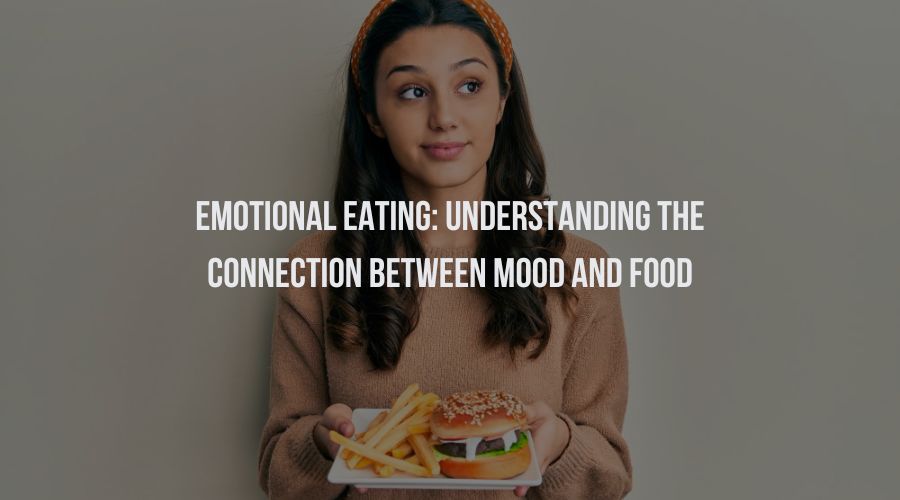
Introduction
Have you ever reached for a tub of ice cream after a rough day, or mindlessly munched on chips while feeling bored? We’ve all been there. Food can be a source of comfort, celebration, and even distraction. But sometimes, our emotional state takes the driver’s seat when it comes to what we eat, leading to a phenomenon called emotional eating.
What is Emotional Eating?
Emotional eating is using food to cope with difficult emotions like stress, anxiety, sadness, or boredom. It’s not about physical hunger, but rather about seeking emotional relief through food. We often crave sugary, fatty, or processed foods, which can provide a temporary mood boost but often leave us feeling worse in the long run.
Why Does Emotional Eating Happen?
Our brains are wired to seek pleasure and reward. Food, especially sugary and fatty options, triggers the release of dopamine, a feel-good chemical. This creates a positive association between eating and feeling better, making it tempting to turn to food when emotions are running high.
Emotional Eating vs. Mindful Eating
There’s a difference between emotional eating and mindful eating. Mindful eating is about paying attention to your body’s hunger cues and enjoying your food without distractions. It’s about savoring the taste, texture, and aroma of your meal. Emotional eating, on the other hand, is often done mindlessly, without much awareness of what or how much you’re eating.
The Cycle of Emotional Eating
Emotional eating can become a vicious cycle. Here’s how it often plays out:
1. Emotional Trigger
You experience a stressful situation, feel sad, or get bored.
2. Craving for Comfort Food
You crave sugary, fatty, or processed foods that you associate with feeling good.
3. Overeating
You eat more than you intended, often mindlessly.
4. Guilt and Shame
You feel guilty and ashamed about overeating, which can lead to more stress and cravings.
Breaking Free from Emotional Eating
Incorporating these tips into your weight loss treatment plan can help you overcome emotional eating and develop a sustainable approach to healthy eating.
1. Identify Your Triggers
The first step is to become aware of what triggers your emotional eating. Are there certain situations, emotions, or times of day that make you more likely to turn to food for comfort?
2. Mindful Check-Ins
Before reaching for a snack, take a moment to ask yourself if you’re truly hungry. Are your physical hunger cues present (stomach growling, feeling lightheaded)? Or are you experiencing an emotion that you’re trying to suppress?
3. Develop Healthy Coping Mechanisms
Find alternative ways to cope with difficult emotions. Exercise, spending time in nature, journaling, or talking to a friend can be great stress relievers.
4. Practice Mindfulness
Mindfulness exercises like meditation or deep breathing can help you become more aware of your thoughts and feelings, allowing you to respond to them in a healthier way.
5. Don't Deprive Yourself
Restricting certain foods can backfire and lead to cravings. Allow yourself to enjoy all foods in moderation.
6. Focus on Nourishment, Not Restriction
Instead of focusing on weight loss, shift your focus to nourishing your body with healthy, whole foods that make you feel good.
7. Seek Professional Help
If emotional eating is significantly impacting your life, consider seeking help from a therapist or registered dietitian to develop a personalized weight management program that addresses both your emotional and physical well-being.
Emotional Eating and Weight Loss
While emotional eating can contribute to weight gain, it’s important to understand that it’s not the sole culprit. If you’re on a weight loss journey, focusing solely on quick fixes like fat burners, fat loss medication, cryotherapy fat loss, or liposuction surgery might not address the underlying emotional factors that can sabotage your progress. This is why consulting a nutritionist at Perfect Point Kanpur with expertise in weight loss issues can be crucial. A nutritionist at Perfect Point Kanpur who specializes in weight loss can help you develop a holistic plan that addresses both your emotional eating triggers and provides guidance on healthy eating habits for sustainable weight loss.
Looking for Support in Kanpur?
Perfect Point can help! Our weight management program recognizes the challenges of emotional eating. Our nutritionist offers a variety of options with expert support and care to help you achieve your weight loss goals. They can also connect you with a registered dietitian or therapist for weight loss treatment in Kanpur area who specializes in eating disorders.
Remember, changing your relationship with food takes time and self-compassion. Don’t beat yourself up if you have setbacks. Just keep practicing these tips and celebrate your progress along the way. You’re not alone! Many people struggle with emotional eating. By understanding the connection between mood and food, developing healthy coping mechanisms, and seeking support when needed, you can break free from this cycle and develop a healthier relationship with food.



